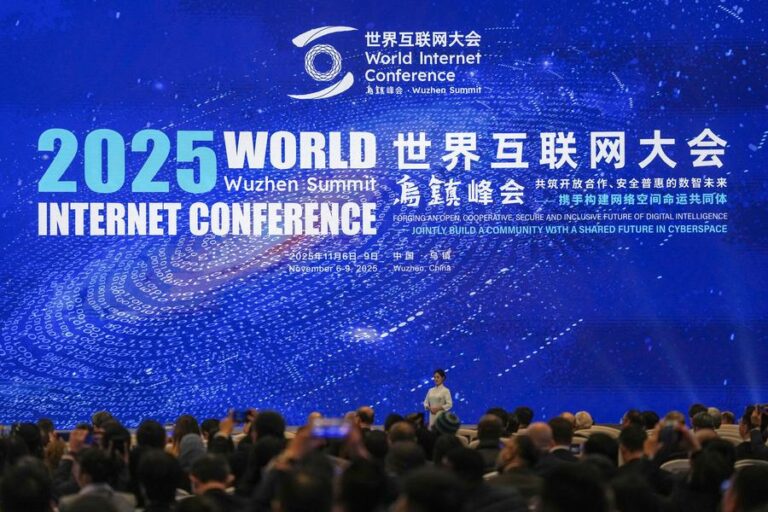HANGZHOU, Nov. 8 (Xinhua) — With artificial intelligence (AI) evolving at breakneck pace, one cannot help but wonder how it will reshape our daily lives in the near future, and how we need to navigate potential challenges stemming from its rapid advancement.
At the 2025 World Internet Conference (WIC) Wuzhen Summit which opened on Friday in eastern China, founders and executives of Chinese tech companies shared their vision regarding topics such as AI. The event in Zhejiang Province has drawn over 1,600 participants from more than 130 countries and regions.
Wang Xingxing, founder and CEO of Unitree Robotics, a leader in legged and humanoid robotics, believes that AI is fueling accelerated growth across the robotics sector.
He said that many scenarios once confined to science fiction, like robots dancing and performing, have become reality in the past year alone. “The next two years will bring even greater surprises,” he noted at a meeting at the summit on Friday.
Also upbeat about AI’s speedy advancement, Liu Qiangdong, founder and chairman of e-commerce giant JD.com, said that robotics is poised to revolutionize the logistics ecosystem.
Addressing the opening ceremony, he highlighted that JD’s recently established sorting center in Beijing has already replaced 90 percent of its former workforce with robots, and that by next April, the company will launch the world’s first fully unmanned delivery station.
Han Bicheng, founder and CEO of the brain-machine interface company BrainCo, envisions expanding this technology’s reach beyond its current focus on assisting people with disabilities — to serve wider populations.
He said the company will roll out a next-generation sleep aid next year and a weight management product in the coming two years, all aimed at addressing diverse challenges in daily life.
As the WIC Wuzhen Summit marks its 12th edition, AI has unquestionably stolen the show.
In recent years, the government’s supportive policies on AI have acted as a powerful catalyst, propelling the AI industry into explosive growth and positioning China at the forefront of global technological innovation.
In August, China’s State Council published a document on boosting the large-scale commercial application of AI, stipulating that by 2030, the adoption rate of new-generation smart terminals, agents and other applications will exceed 90 percent, and by 2035, China will fully enter a new phase of development characterized by an intelligent economy and an intelligent society.
Eddie Wu, CEO of e-commerce and AI titan Alibaba, expressed full confidence in achieving this goal. He revealed at the opening ceremony that Alibaba is currently constructing massive AI infrastructure and significantly increasing investments to build a super AI cloud. Through its full-stack technological capabilities, the company aims to provide leading AI services to developers worldwide.
“AI’s potential to liberate both productivity and humanity itself will surpass all expectations,” he added.
AI’s swift ascent, however, is prompting growing concerns about human job displacement — a key issue that tech company leaders sought to address.
Noting that AI could displace many jobs in the market in the coming decade or two, Chen Deli, senior researcher of DeepSeek, said that tech companies have a responsibility to identify these at-risk roles and raise public awareness.
“Tech companies should act as guardians of humanity, safeguarding human safety and participating in the reshaping of social order,” he said.
Yet, he remains optimistic about the future, believing that while some jobs will vanish and others emerge, overall societal productivity will increase — with humanity retaining its unshakable role as the center of wisdom.
Feng Ji, founder and CEO of Game Science, the developer of the blockbuster video game “Black Myth: Wukong,” echoed Chen’s view, saying that AI should empower ordinary people, rather than being a technology concentrated solely in the hands of tech companies.
“The true potential of AI lies in its ability to give us more time to freely pursue our passions and expertise,” he added. ■

